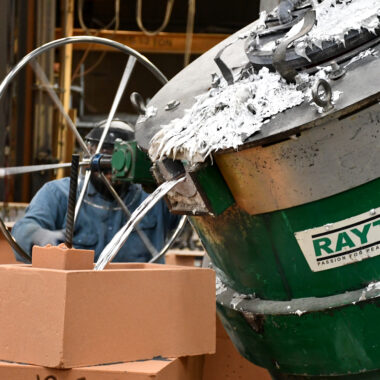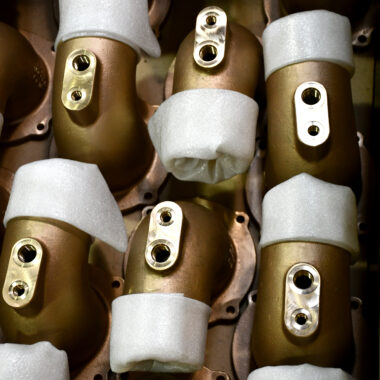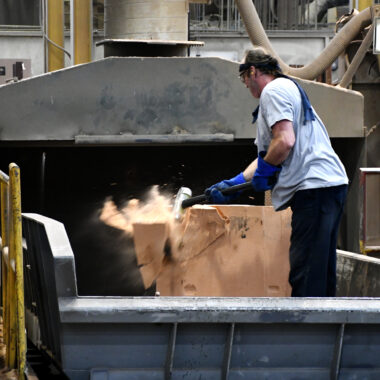Casting Aluminum Mastery: Unleash Your Creative Prospective
Casting Aluminum Mastery: Unleash Your Creative Prospective
Blog Article
The Conclusive Manual on Light Weight Aluminum Casting Services
Within the detailed world of aluminum casting solutions lies a wealth of understanding waiting to be checked out. As sectors remain to demand precision and high quality, comprehending the nuances of light weight aluminum spreading processes becomes vital. From the crucial devices and devices to the important aspect of top quality control, every detail plays a considerable role fit the last result. What really sets a detailed handbook apart is its ability to not only give foundational knowledge but likewise to offer understandings right into making the most of effectiveness and efficiency. As we browse via this definitive handbook, uncovering industry fads and technologies that shape the landscape of aluminum spreading services, we are advised of the endless possibilities that await those going to immerse themselves in this complex craft.

Understanding Aluminum Casting Processes
Discovering the details of aluminum casting processes discloses the precision and intricacy included in changing liquified steel into intricate parts. Light weight aluminum spreading is a meticulous manufacturing method that entails the pouring of liquified light weight aluminum right into a mold and mildew to produce a desired form.
Throughout the cooling procedure, the light weight aluminum takes the shape and solidifies of the mold. What adheres to is thorough craftsmanship to eliminate any type of blemishes and fine-tune the element to satisfy the required requirements. This process requires an eager eye for information and a deep understanding of metallurgy to make sure the end product's quality and stability.
Recognizing the nuances of light weight aluminum casting processes is critical for generating high-quality components that fulfill industry standards and demands. From aerospace to automotive sectors, the accuracy of aluminum casting plays a crucial function in making dependable and resilient components.
Necessary Devices and Tools
What devices and devices are essential for attaining precision and efficiency in aluminum spreading processes? To make certain successful aluminum casting, a number of necessary tools and devices are called for. Crucible furnaces play an essential role in melting the aluminum alloys, offering the liquified steel necessary for spreading. Crucibles constructed from materials like clay graphite or silicon carbide are typically utilized because of their high heat resistance. In addition, a ladle is necessary for moving the molten steel from the heating system to the mold and mildews properly. Air flow systems are essential to get rid of any fumes or gases produced during the casting procedure, making certain a risk-free functioning setting. Mold and mildews, made from products such as sand or steel, are needed to form the liquified metal right into the preferred type. Various other tools like tongs, putting basins, and cooling chambers are additionally important for dealing with the molten steel and ensuring correct solidification. By using these devices and equipment properly, light weight aluminum spreading solutions can attain high accuracy and efficiency in their processes.
Quality Control in Aluminum Spreading
Ensuring constant high quality criteria is paramount in aluminum casting processes to satisfy sector demands and customer assumptions. Quality control in aluminum casting involves a methodical strategy to tracking and assessing every phase of the casting process to assure the final product's stability. To achieve this, different approaches are used, such as aesthetic assessments, dimensional checks, non-destructive testing, and product analysis. Visual evaluations are performed to recognize surface issues like cracks, porosity, or insufficient fills. Dimensional checks make certain that the casting satisfies accurate specs. Non-destructive screening techniques like X-ray, ultrasonic, or dye penetrant assessments can find casting aluminum interior flaws without damaging the component. Material analysis via spectroscopy or chemical testing verifies the structure of the aluminum alloy made use of (casting aluminum). By carrying out stringent quality assurance steps, light weight aluminum casting company can provide elements that comply with the highest possible requirements of efficiency, dependability, and high quality, eventually satisfying both industry laws and consumer needs.

Making The Most Of Effectiveness and Efficiency
To enhance operational efficiency in aluminum spreading solutions, enhancing effectiveness and productivity is critical for conference production demands and maintaining affordable advantage in the market. Carrying out lean manufacturing concepts, such as lessening waste and streamlining procedures, can significantly boost total effectiveness. Making use of innovative technology, like computer-aided design (CAD) software program and automated systems, can improve productivity by decreasing manual labor and raising precision.

Teaming up carefully with vendors to make sure a stable flow of check my reference premium materials and carrying out durable scheduling and stock monitoring systems are likewise key techniques for making best use of efficiency in light weight aluminum casting services. By focusing on these areas, companies can attain higher degrees of productivity, meet consumer demands effectively, and remain ahead in an open market.
Industry Fads and Developments
In response to the evolving landscape of aluminum spreading solutions, staying abreast of sector patterns and advancements is imperative for keeping an one-upmanship and fulfilling the vibrant demands of the marketplace. One notable fad in the light weight aluminum casting market is the increasing emphasis on sustainability and ecological obligation. Companies are taking on greener practices, such as making use of recycled aluminum and executing energy-efficient processes, to line up with consumer expectations and regulative needs.
Additionally, improvements in modern technology are reinventing aluminum spreading processes. The integration of automation, robotics, and expert system is streamlining production, boosting precision, and decreasing preparations. 3D printing is also making waves in the market by enabling complicated geometries to be generated with better efficiency and cost-effectiveness.
Moreover, there is an expanding emphasis on customization and product personalization. With consumers seeking one-of-a-kind and tailored products, light weight aluminum spreading solutions are adjusting to supply even more versatile manufacturing remedies. By welcoming these market patterns and innovations, firms can position themselves for success in a quickly progressing market.
Final Thought
To conclude, the handbook on aluminum casting solutions supplies a comprehensive summary of the procedures, tools, top quality control measures, performance strategies, and market fads in the area. By comprehending these crucial elements, services can improve their casting processes, ensure high-quality products, and remain competitive on the market. This clear-cut handbook acts as an important resource for those associated with aluminum casting solutions.
As sectors visit this page proceed to demand precision and high quality, understanding the subtleties of aluminum spreading processes ends up being extremely important (casting aluminum). Light weight aluminum casting is a meticulous manufacturing technique that involves the putting of molten light weight aluminum into a mold to create a preferred form.Ensuring consistent high quality requirements is paramount in light weight aluminum casting processes to satisfy market needs and consumer assumptions. Quality control in aluminum casting entails a methodical technique to monitoring and examining every phase of the spreading process to ensure the final item's integrity.In final thought, the handbook on aluminum spreading solutions supplies a thorough review of the processes, tools, high quality control steps, effectiveness approaches, and industry trends in the area
Report this page